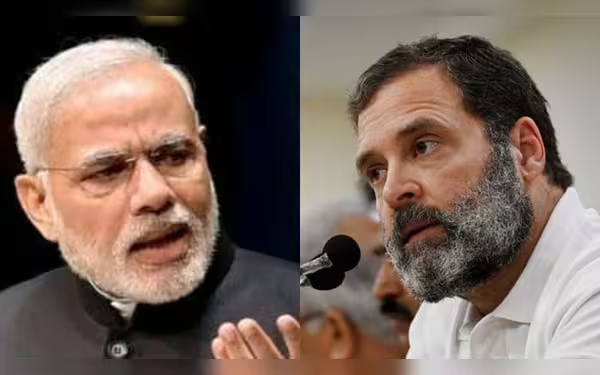Saturday, October 5, 2024 10:28 PM
Rahul Gandhi Criticizes Modi Government for Wealth Disparity in India
- Gandhi highlights Ambani's lavish wedding expenses.
- Accuses Modi of favoring billionaires over farmers.
- Calls for accountability in wealth distribution.
 Image Credits: geo
Image Credits: geoRahul Gandhi criticizes Modi for enabling billionaires like Ambani to spend lavishly while farmers struggle financially.
In recent times, the political landscape in India has been marked by intense debates surrounding wealth distribution and economic inequality. One of the most prominent voices in this discourse is Rahul Gandhi, the leader of the opposition in the Lok Sabha. On Tuesday, he made headlines by criticizing Prime Minister Narendra Modi for allegedly creating a system that allows a select few, particularly billionaires like Mukesh Ambani, to spend lavishly while the average citizen struggles financially.
During a public rally in Bahadurgarh, Haryana, which is gearing up for elections, Gandhi drew a stark contrast between the extravagant wedding of Ambani's youngest son and the financial plight of farmers across the nation. He stated, "Have you seen Ambani's wedding? Ambani spent crores on the wedding. Whose money is this? It is your money.... You take bank loans to marry your children, but Narendra Modi ji has made such a structure under which the selected 25 people can spend crores on weddings, but a farmer can organize a wedding only after drowning in debt." This statement highlights the growing concern among the populace regarding the disparity in wealth and the perceived favoritism shown towards the wealthy elite.
Gandhi's remarks did not stop at weddings; he further accused PM Modi of facilitating a system that benefits industrialists like Ambani and Adani at the expense of the common man. He claimed, "When PM Modi waives off loans worth Rs 16 lakh crores of billionaires and does not waive the loan of farmers and students, then they are attacking the Constitution." This assertion raises critical questions about the government's priorities and its impact on the average citizen's life.
This is not the first instance where Gandhi has voiced his concerns regarding the Modi administration's policies. In previous sessions of Parliament, he has pointed out what he describes as a monopoly held by a couple of industrialists over the nation's wealth. He remarked, "Two industrialists are controlling the country... If I cannot take their names in the House, then I will have to say something, I will just say A1 and A2." Such statements resonate with many who feel that the economic policies favor a small group while neglecting the broader population.
As the political climate heats up with elections on the horizon, the discourse surrounding wealth inequality and government accountability is likely to intensify. The concerns raised by Gandhi reflect a growing sentiment among citizens who are increasingly aware of the disparities in wealth and the challenges faced by the working class. It is essential for voters to critically evaluate the policies of their leaders and consider how these decisions impact their daily lives. The ongoing dialogue about economic justice and the role of government in addressing these issues will undoubtedly shape the future of India.













